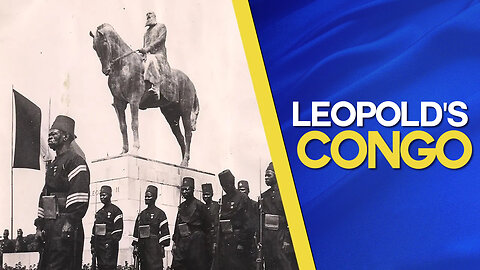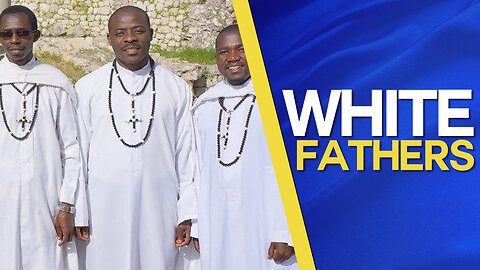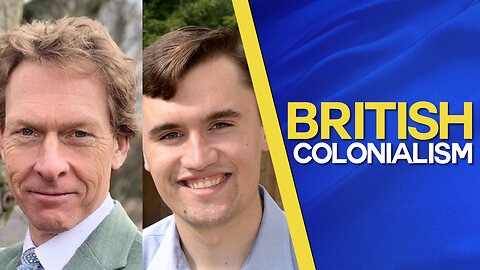
Deprogramming
32 videos
Updated 10 months ago
Deprogramming efforts seek to counteract overly simplistic or one-sided portrayals of colonialism by encouraging critical thinking and nuanced analysis. This involves challenging the demonization of all aspects of colonial rule and recognizing the diversity of experiences within colonized societies, including instances where individuals may have benefited from certain aspects of colonial administration or cultural exchange.
-
In Defense of King Léopold’s Congo
 Belgian CongoWatch Full Episode: https://www.youtube.com/watch?v=XVYA_sjHztQ For the past 25 years, the idea of the Congo has been closely linked in the Western imagination to the 1998 book King Leopold’s Ghost by the American journalist Adam Hochschild. The book is widely assigned in high schools and colleges, and it regularly tops best-seller lists in colonial, African, and Western history. Hochschild has become a sort of king of the Congo, or at least of its history. The book is reflexively cited by reputable scholars in their footnotes any time they wish to assert that it is “well known” and “beyond doubt” that sinister men in Europe wrought havoc in Africa over a century ago. Any discussion of the Congo, or of European colonialism more generally, invariably begins with the question: “Have you read King Leopold’s Ghost?” Follow Dr. Peter Boghossian on Twitter: https://twitter.com/peterboghossian Follow Dr. Bruce Gilley on Twitter: https://twitter.com/BruceDGilley Follow Belgian Congo on Twitter: https://twitter.com/BasedCongo #CongoFreeState #PeterBoghossian #BruceGilley53 views
Belgian CongoWatch Full Episode: https://www.youtube.com/watch?v=XVYA_sjHztQ For the past 25 years, the idea of the Congo has been closely linked in the Western imagination to the 1998 book King Leopold’s Ghost by the American journalist Adam Hochschild. The book is widely assigned in high schools and colleges, and it regularly tops best-seller lists in colonial, African, and Western history. Hochschild has become a sort of king of the Congo, or at least of its history. The book is reflexively cited by reputable scholars in their footnotes any time they wish to assert that it is “well known” and “beyond doubt” that sinister men in Europe wrought havoc in Africa over a century ago. Any discussion of the Congo, or of European colonialism more generally, invariably begins with the question: “Have you read King Leopold’s Ghost?” Follow Dr. Peter Boghossian on Twitter: https://twitter.com/peterboghossian Follow Dr. Bruce Gilley on Twitter: https://twitter.com/BruceDGilley Follow Belgian Congo on Twitter: https://twitter.com/BasedCongo #CongoFreeState #PeterBoghossian #BruceGilley53 views -
Doctor en Politicus Thierry Baudet brengt op poëtische wijze hulde aan het kolonialisme
 Belgian CongoDoctor en Politicus Thierry Baudet brengt op poëtische wijze hulde aan het kolonialisme. De Nederlanders hebben een groots en imposant rijk gesticht, zowel in het Oosten als in het Westen. Waar ze ook heengingen, brachten de Nederlanders handel, cultuur en beschaving met zich mee. Dit erfgoed getuigt van een indrukwekkende grandeur waar Nederland trots op kan zijn. Volg Dr. Baudet op Twitter: https://twitter.com/thierrybaudet Volg op Twitter: https://twitter.com/BasedCongo #ThierryBaudet #kolonialisme #NederlandseKoloniën50 views
Belgian CongoDoctor en Politicus Thierry Baudet brengt op poëtische wijze hulde aan het kolonialisme. De Nederlanders hebben een groots en imposant rijk gesticht, zowel in het Oosten als in het Westen. Waar ze ook heengingen, brachten de Nederlanders handel, cultuur en beschaving met zich mee. Dit erfgoed getuigt van een indrukwekkende grandeur waar Nederland trots op kan zijn. Volg Dr. Baudet op Twitter: https://twitter.com/thierrybaudet Volg op Twitter: https://twitter.com/BasedCongo #ThierryBaudet #kolonialisme #NederlandseKoloniën50 views -
King Leopold's Ghost: An absurdly deceptive book is better described as historical fiction
 Belgian CongoRead Dr. Gilley's Article: https://www.theamericanconservative.com/king-hochschilds-hoax/ Read Hochschild's Response: https://www.theamericanconservative.com/the-ghost-still-haunts/ For the past 25 years, the idea of the Congo has been closely linked in the Western imagination to the 1998 book King Leopold’s Ghost by the American journalist Adam Hochschild. The book is widely assigned in high schools and colleges, and it regularly tops best-seller lists in colonial, African, and Western history. Hochschild has become a sort of king of the Congo, or at least of its history. The book is reflexively cited by reputable scholars in their footnotes any time they wish to assert that it is “well known” and “beyond doubt” that sinister men in Europe wrought havoc in Africa over a century ago. Any discussion of the Congo, or of European colonialism more generally, invariably begins with the question: “Have you read King Leopold’s Ghost?” I have read it. And I can declare that it is a vast hoax, full of distortions and errors both numerous and grave, a few of which I will detail in this short essay. Some people might view “King Hochschild’s Hoax,” as we might call it, as an empowering fable for modern Africans at the expense of the white man. But its debilitating effects on Africa, and on the Congo in particular, make the opposite more nearly the case. It is a callous and negligent chicotte (hippo whip) lash on the backs of all black Africans, narcissistic guilt porn for white liberals at the expense of the African. The Congolese lawyer Marcel Yabili calls it “the greatest falsification in modern history,” a compliment of sorts, I suppose. Hochschild’s book is a history of the private domain of the Belgian King Léopold II in the Congo river basin that was founded in 1885 and then handed over to the Belgian government in 1908. The book alternates between diabolical accounts of Léopold and hagiographic accounts of three of his critics: the British campaigner E.D. Morel, the British diplomat Roger Casement, and the black American missionary William Henry Sheppard. The narrative style is dark and conspiratorial, from the initial plans for the domain to its final dissolution. All along, Hochschild’s aim is to elevate the story into one of the greatest evils ever perpetrated by the West upon the Rest. There have been two documentary films about Hochschild’s fable, both travesties of art as well as fact. But the worst is yet to come. A dramatized Hollywood version by the American directors Ben Affleck and Martin Scorsese, co-produced with the singer and activist Harry Belafonte, has been in development since 2019. The history of the Congo might have survived one gut punch from California (Hochschild did his research entirely at libraries in the state and teaches at Berkeley). But once Hollywood weighs in on the matter, history as such will be impossible. Before that happens, let’s set the record straight and end this most malicious form of imperial plunder. Follow Bruce Gilley on Twitter: https://twitter.com/BruceDGilley Follow on Twitter: https://twitter.com/BasedCongo #BruceGilley #LeopoldsGhost #AdamHochschild #CongoFreeState #LeopoldsGhost #KingHochschildsHoax #KingLeopoldII #JudeRusso #TheAmericanConservative135 views
Belgian CongoRead Dr. Gilley's Article: https://www.theamericanconservative.com/king-hochschilds-hoax/ Read Hochschild's Response: https://www.theamericanconservative.com/the-ghost-still-haunts/ For the past 25 years, the idea of the Congo has been closely linked in the Western imagination to the 1998 book King Leopold’s Ghost by the American journalist Adam Hochschild. The book is widely assigned in high schools and colleges, and it regularly tops best-seller lists in colonial, African, and Western history. Hochschild has become a sort of king of the Congo, or at least of its history. The book is reflexively cited by reputable scholars in their footnotes any time they wish to assert that it is “well known” and “beyond doubt” that sinister men in Europe wrought havoc in Africa over a century ago. Any discussion of the Congo, or of European colonialism more generally, invariably begins with the question: “Have you read King Leopold’s Ghost?” I have read it. And I can declare that it is a vast hoax, full of distortions and errors both numerous and grave, a few of which I will detail in this short essay. Some people might view “King Hochschild’s Hoax,” as we might call it, as an empowering fable for modern Africans at the expense of the white man. But its debilitating effects on Africa, and on the Congo in particular, make the opposite more nearly the case. It is a callous and negligent chicotte (hippo whip) lash on the backs of all black Africans, narcissistic guilt porn for white liberals at the expense of the African. The Congolese lawyer Marcel Yabili calls it “the greatest falsification in modern history,” a compliment of sorts, I suppose. Hochschild’s book is a history of the private domain of the Belgian King Léopold II in the Congo river basin that was founded in 1885 and then handed over to the Belgian government in 1908. The book alternates between diabolical accounts of Léopold and hagiographic accounts of three of his critics: the British campaigner E.D. Morel, the British diplomat Roger Casement, and the black American missionary William Henry Sheppard. The narrative style is dark and conspiratorial, from the initial plans for the domain to its final dissolution. All along, Hochschild’s aim is to elevate the story into one of the greatest evils ever perpetrated by the West upon the Rest. There have been two documentary films about Hochschild’s fable, both travesties of art as well as fact. But the worst is yet to come. A dramatized Hollywood version by the American directors Ben Affleck and Martin Scorsese, co-produced with the singer and activist Harry Belafonte, has been in development since 2019. The history of the Congo might have survived one gut punch from California (Hochschild did his research entirely at libraries in the state and teaches at Berkeley). But once Hollywood weighs in on the matter, history as such will be impossible. Before that happens, let’s set the record straight and end this most malicious form of imperial plunder. Follow Bruce Gilley on Twitter: https://twitter.com/BruceDGilley Follow on Twitter: https://twitter.com/BasedCongo #BruceGilley #LeopoldsGhost #AdamHochschild #CongoFreeState #LeopoldsGhost #KingHochschildsHoax #KingLeopoldII #JudeRusso #TheAmericanConservative135 views -
Esther Anumu Fordham - Growing up Black in Nazi Germany
 Belgian CongoEsther Fordham was a Togolese woman who, born October 9, 1925 in Hamburg, Germany, came of age during the Nazi era. In this December, 1995 conversation with artist Frank Fitzgerald, Esther discusses her youth, schooling and the reaction of classmates and adult Germans to her specialness. As world conditions darken and war grows to become the norm, she finds discrimination, fear, sorrow and horror, but also generosity and hope. After the bombings cease, amid the rubble Esther meets and marries an American soldier. Giving birth in an Army hospital, she wonders why she has a whole maternity ward to herself. Later, living in America, she slowly learns about prejudice, segregation and lynchings. Throughout all, Esther Anumu Fordham strives to see "people as human beings" and succeeds. In 1997, after having raised a family and worked 20+ years for an airline, Esther retired and returned to Germany. At age 94 years, Esther passed away in 2019. Follow on Twitter: https://twitter.com/BasedCongo #nazigermany #togolese #worldwarii48 views
Belgian CongoEsther Fordham was a Togolese woman who, born October 9, 1925 in Hamburg, Germany, came of age during the Nazi era. In this December, 1995 conversation with artist Frank Fitzgerald, Esther discusses her youth, schooling and the reaction of classmates and adult Germans to her specialness. As world conditions darken and war grows to become the norm, she finds discrimination, fear, sorrow and horror, but also generosity and hope. After the bombings cease, amid the rubble Esther meets and marries an American soldier. Giving birth in an Army hospital, she wonders why she has a whole maternity ward to herself. Later, living in America, she slowly learns about prejudice, segregation and lynchings. Throughout all, Esther Anumu Fordham strives to see "people as human beings" and succeeds. In 1997, after having raised a family and worked 20+ years for an airline, Esther retired and returned to Germany. At age 94 years, Esther passed away in 2019. Follow on Twitter: https://twitter.com/BasedCongo #nazigermany #togolese #worldwarii48 views -
Unité Congo-Belgique
 Belgian Congo"La chanson 'Congo-Belgique' est un appel à la conscience pour le peuple congolais de faire face à sa misère qui semble perdurer éternellement. C'est notre devoir d'éclaircir l'ambiguïté, de ne pas laisser nos générations futures languir sous la misère dont nous, les parents, sommes responsables." Merci à: @phillipemakasibondoofficie6695 Suivre sur Twitter: https://twitter.com/BasedCongo #CongoBelge #PhilippeMakasi #LaHauteMelodie #DjefMawete20 views
Belgian Congo"La chanson 'Congo-Belgique' est un appel à la conscience pour le peuple congolais de faire face à sa misère qui semble perdurer éternellement. C'est notre devoir d'éclaircir l'ambiguïté, de ne pas laisser nos générations futures languir sous la misère dont nous, les parents, sommes responsables." Merci à: @phillipemakasibondoofficie6695 Suivre sur Twitter: https://twitter.com/BasedCongo #CongoBelge #PhilippeMakasi #LaHauteMelodie #DjefMawete20 views -
The Missionaries Who liberated Africa from Slavery
 Belgian CongoIn the 19th Century, England's great industrial cities had a crying need for missionaries because millions never set foot in church. Subscribe to Our History: But the "heathens" of the English slums came second to the exotic mission field of Africa. The missionaries went in the name of the Christian God but they were also explorers who laid the foundation for the great European empires. Behind them came the traders and administrators. Includes a look at present day missionary work in Tanzania. Follow on Twitter: https://twitter.com/BasedCongo50 views
Belgian CongoIn the 19th Century, England's great industrial cities had a crying need for missionaries because millions never set foot in church. Subscribe to Our History: But the "heathens" of the English slums came second to the exotic mission field of Africa. The missionaries went in the name of the Christian God but they were also explorers who laid the foundation for the great European empires. Behind them came the traders and administrators. Includes a look at present day missionary work in Tanzania. Follow on Twitter: https://twitter.com/BasedCongo50 views -
Was European Colonialism Racist?
 Belgian CongoThe subjective legitimacy approach asks whether the people subject to colonialism treated it, through their beliefs and actions, as rightful. As Hechter showed, alien rule has often been legitimate in world history because it has provided better governance than the indigenous alternative. Yet anti-colonial critics simply assert that colonialism was, in Hopkins’s words, “a foreign imposition lacking popular legitimacy.” Until very late, European colonialism appears to have been highly legitimate and for good reasons. Millions of people moved closer to areas of more intensive colonial rule, sent their children to colonial schools and hospitals, went beyond the call of duty in positions in colonial governments, reported crimes to colonial police, migrated from non-colonized to colonized areas, fought for colonial armies, and participated in colonial political processes—all relatively voluntary acts. Indeed, the rapid spread and persistence of Western colonialism with very little force relative to the populations and geographies concerned is prima facie evidence of its acceptance by subject populations compared to the feasible alternatives. The “preservers,” “facilitators,” and “collaborators” of colonialism, as Abernethy shows, far outnumbered the “resisters,” at least until very late: “Imperial expansion was frequently the result not just of European push but also of indigenous pull." In Borneo, the Sultan of Brunei installed an English traveler James Brooke, as the rajah of his chaotic province of Sarawak in 1841. Order and prosperity expanded to such an extent that even once a British protectorate was established in 1888, the Sultan preferred to leave it under Brooke family control until 1946. Sir Alan Burns, the governor of the Gold Coast during World War II, noted that “had the people of the Gold Coast wished to push us into the sea there was little to prevent them. But this was the time when the people came forward in their thousands, not with empty protestations of loyalty but with men to serve in the army... and with liberal gifts to war funds and war charities. This was curious conduct for people tired of British rule.” In most colonial areas, subject peoples either faced grave security threats from rival groups or they saw the benefits of being governed by a modernized and liberal state. Patrice Lumumba, who became an anti-colonial agitator only very late, praised Belgian colonial rule in his autobiography of 1962 for “restoring our human dignity and turning us into free, happy, vigorous, and civilized men.” Chinua Achebe’s many pro-colonial statements, meanwhile, have been virtually airbrushed from memory by anti-colonial ideology. The few scholars who take note of such evidence typically dismiss it as a form of false consciousness. The failure of anti-colonial critique to come to terms with the objective benefits and subjective legitimacy of colonialism points to a third and deeper failure: it was never intended to be “true” in the sense of being a scientific claim justified through shared standards of inquiry that was liable to falsification. The origins of anti-colonial thought were political and ideological. The purpose was not historical accuracy but contemporaneous advocacy. Today, activists associate “decolonization” (or “postcolonialism”) with all manner of radical social transformation, which unintentionally ties historic conclusions to present-day endeavors. Unmoored from historical fact, postcolonialism became what Williams called a metropolitan flaneur culture of attitude and performance whose recent achievements include an inquiry into the glories of sadomasochism among Third World women and a burgeoning literature on the horrors of colonialism under countries that never had colonies. Follow on Twitter: https://twitter.com/BasedCongo Follow Professor Gilley on Twitter: https://twitter.com/BruceDGilley Follow TRIGGERnometry on Twitter: https://twitter.com/triggerpod #BruceGilley #Racism #colonialism114 views
Belgian CongoThe subjective legitimacy approach asks whether the people subject to colonialism treated it, through their beliefs and actions, as rightful. As Hechter showed, alien rule has often been legitimate in world history because it has provided better governance than the indigenous alternative. Yet anti-colonial critics simply assert that colonialism was, in Hopkins’s words, “a foreign imposition lacking popular legitimacy.” Until very late, European colonialism appears to have been highly legitimate and for good reasons. Millions of people moved closer to areas of more intensive colonial rule, sent their children to colonial schools and hospitals, went beyond the call of duty in positions in colonial governments, reported crimes to colonial police, migrated from non-colonized to colonized areas, fought for colonial armies, and participated in colonial political processes—all relatively voluntary acts. Indeed, the rapid spread and persistence of Western colonialism with very little force relative to the populations and geographies concerned is prima facie evidence of its acceptance by subject populations compared to the feasible alternatives. The “preservers,” “facilitators,” and “collaborators” of colonialism, as Abernethy shows, far outnumbered the “resisters,” at least until very late: “Imperial expansion was frequently the result not just of European push but also of indigenous pull." In Borneo, the Sultan of Brunei installed an English traveler James Brooke, as the rajah of his chaotic province of Sarawak in 1841. Order and prosperity expanded to such an extent that even once a British protectorate was established in 1888, the Sultan preferred to leave it under Brooke family control until 1946. Sir Alan Burns, the governor of the Gold Coast during World War II, noted that “had the people of the Gold Coast wished to push us into the sea there was little to prevent them. But this was the time when the people came forward in their thousands, not with empty protestations of loyalty but with men to serve in the army... and with liberal gifts to war funds and war charities. This was curious conduct for people tired of British rule.” In most colonial areas, subject peoples either faced grave security threats from rival groups or they saw the benefits of being governed by a modernized and liberal state. Patrice Lumumba, who became an anti-colonial agitator only very late, praised Belgian colonial rule in his autobiography of 1962 for “restoring our human dignity and turning us into free, happy, vigorous, and civilized men.” Chinua Achebe’s many pro-colonial statements, meanwhile, have been virtually airbrushed from memory by anti-colonial ideology. The few scholars who take note of such evidence typically dismiss it as a form of false consciousness. The failure of anti-colonial critique to come to terms with the objective benefits and subjective legitimacy of colonialism points to a third and deeper failure: it was never intended to be “true” in the sense of being a scientific claim justified through shared standards of inquiry that was liable to falsification. The origins of anti-colonial thought were political and ideological. The purpose was not historical accuracy but contemporaneous advocacy. Today, activists associate “decolonization” (or “postcolonialism”) with all manner of radical social transformation, which unintentionally ties historic conclusions to present-day endeavors. Unmoored from historical fact, postcolonialism became what Williams called a metropolitan flaneur culture of attitude and performance whose recent achievements include an inquiry into the glories of sadomasochism among Third World women and a burgeoning literature on the horrors of colonialism under countries that never had colonies. Follow on Twitter: https://twitter.com/BasedCongo Follow Professor Gilley on Twitter: https://twitter.com/BruceDGilley Follow TRIGGERnometry on Twitter: https://twitter.com/triggerpod #BruceGilley #Racism #colonialism114 views -
In Defence of British Colonialism
 Belgian CongoUntil very late, European colonialism appears to have been highly legitimate and for good reasons. Millions of people moved closer to areas of more intensive colonial rule, sent their children to colonial schools and hospitals, went beyond the call of duty in positions in colonial governments, reported crimes to colonial police, migrated from non-colonized to colonized areas, fought for colonial armies, and participated in colonial political processes—all relatively voluntary acts. Indeed, the rapid spread and persistence of Western colonialism with very little force relative to the populations and geographies concerned is prima facie evidence of its acceptance by subject populations compared to the feasible alternatives. The “preservers,” “facilitators,” and “collaborators” of colonialism, as Abernethy shows, far outnumbered the “resisters,” at least until very late: “Imperial expansion was frequently the result not just of European push but also of indigenous pull.” In Borneo, the Sultan of Brunei installed an English traveler James Brooke, as the rajah of his chaotic province of Sarawak in 1841. Order and prosperity expanded to such an extent that even once a British protectorate was established in 1888, the Sultan preferred to leave it under Brooke family control until 1946. Sir Alan Burns, the governor of the Gold Coast during World War II, noted that “had the people of the Gold Coast wished to push us into the sea there was little to prevent them. But this was the time when the people came forward in their thousands, not with empty protestations of loyalty but with men to serve in the army . . . and with liberal gifts to war funds and war charities. This was curious conduct for people tired of British rule.” In most colonial areas, subject peoples either faced grave security threats from rival groups or they saw the benefits of being governed by a modernized and liberal state. Patrice Lumumba, who became an anti-colonial agitator only very late, praised Belgian colonial rule in his autobiography of 1962 for “restoring our human dignity and turning us into free, happy, vigorous, and civilized men.” Chinua Achebe’s many pro-colonial statements, meanwhile, have been virtually airbrushed from memory by anti-colonial ideology. The few scholars who take note of such evidence typically dismiss it as a form of false consciousness. The failure of anti-colonial critique to come to terms with the objective benefits and subjective legitimacy of colonialism points to a third and deeper failure: it was never intended to be “true” in the sense of being a scientific claim justified through shared standards of inquiry that was liable to falsification. The origins of anti-colonial thought were political and ideological. The purpose was not historical accuracy but contemporaneous advocacy. Today, activists associate “decolonization” (or “postcolonialism”) with all manner of radical social transformation, which unintentionally ties historic conclusions to present-day endeavors. Unmoored from historical fact, postcolonialism became what Williams called a metropolitan flaneur culture of attitude and performance whose recent achievements include an inquiry into the glories of sadomasochism among Third World women and a burgeoning literature on the horrors of colonialism under countries that never had colonies. This third failure of anti-colonial critique is perhaps most damaging. It is not just an obstacle to historical truth, which itself is a grave disservice. Even as a means of contemporary advocacy, it is self-wounding. For it essentially weaponizes the colonial past, as the gradually imploding postcolonial South African state’s persecution of Helen Zille shows. “What a meta-narrative of anti-colonial sentiment can render invisible are ways in which people made claims on new possibilities without deploying either anti- or pro-colonial idioms,” Englund writes in his study of colonial-era newspapers in Zambia. “To devote all scholarly attention to the question of how different actors during this period sought to end colonial rule is to succumb to a limiting meta-narrative of anti-colonialism, one that allows no conceptual space between colonial and anti-colonial agendas, and thereby keeps other possibilities inaccessible to the scholarly and moral imagination.” Follow on Twitter: https://twitter.com/BasedCongo Follow Professor Gilley on Twitter: https://twitter.com/BruceDGilley Follow Charlie Kirk on Twitter: https://twitter.com/charliekirk11 #BruceGilley #CharlieKirk #BritishEmpire138 views 3 comments
Belgian CongoUntil very late, European colonialism appears to have been highly legitimate and for good reasons. Millions of people moved closer to areas of more intensive colonial rule, sent their children to colonial schools and hospitals, went beyond the call of duty in positions in colonial governments, reported crimes to colonial police, migrated from non-colonized to colonized areas, fought for colonial armies, and participated in colonial political processes—all relatively voluntary acts. Indeed, the rapid spread and persistence of Western colonialism with very little force relative to the populations and geographies concerned is prima facie evidence of its acceptance by subject populations compared to the feasible alternatives. The “preservers,” “facilitators,” and “collaborators” of colonialism, as Abernethy shows, far outnumbered the “resisters,” at least until very late: “Imperial expansion was frequently the result not just of European push but also of indigenous pull.” In Borneo, the Sultan of Brunei installed an English traveler James Brooke, as the rajah of his chaotic province of Sarawak in 1841. Order and prosperity expanded to such an extent that even once a British protectorate was established in 1888, the Sultan preferred to leave it under Brooke family control until 1946. Sir Alan Burns, the governor of the Gold Coast during World War II, noted that “had the people of the Gold Coast wished to push us into the sea there was little to prevent them. But this was the time when the people came forward in their thousands, not with empty protestations of loyalty but with men to serve in the army . . . and with liberal gifts to war funds and war charities. This was curious conduct for people tired of British rule.” In most colonial areas, subject peoples either faced grave security threats from rival groups or they saw the benefits of being governed by a modernized and liberal state. Patrice Lumumba, who became an anti-colonial agitator only very late, praised Belgian colonial rule in his autobiography of 1962 for “restoring our human dignity and turning us into free, happy, vigorous, and civilized men.” Chinua Achebe’s many pro-colonial statements, meanwhile, have been virtually airbrushed from memory by anti-colonial ideology. The few scholars who take note of such evidence typically dismiss it as a form of false consciousness. The failure of anti-colonial critique to come to terms with the objective benefits and subjective legitimacy of colonialism points to a third and deeper failure: it was never intended to be “true” in the sense of being a scientific claim justified through shared standards of inquiry that was liable to falsification. The origins of anti-colonial thought were political and ideological. The purpose was not historical accuracy but contemporaneous advocacy. Today, activists associate “decolonization” (or “postcolonialism”) with all manner of radical social transformation, which unintentionally ties historic conclusions to present-day endeavors. Unmoored from historical fact, postcolonialism became what Williams called a metropolitan flaneur culture of attitude and performance whose recent achievements include an inquiry into the glories of sadomasochism among Third World women and a burgeoning literature on the horrors of colonialism under countries that never had colonies. This third failure of anti-colonial critique is perhaps most damaging. It is not just an obstacle to historical truth, which itself is a grave disservice. Even as a means of contemporary advocacy, it is self-wounding. For it essentially weaponizes the colonial past, as the gradually imploding postcolonial South African state’s persecution of Helen Zille shows. “What a meta-narrative of anti-colonial sentiment can render invisible are ways in which people made claims on new possibilities without deploying either anti- or pro-colonial idioms,” Englund writes in his study of colonial-era newspapers in Zambia. “To devote all scholarly attention to the question of how different actors during this period sought to end colonial rule is to succumb to a limiting meta-narrative of anti-colonialism, one that allows no conceptual space between colonial and anti-colonial agendas, and thereby keeps other possibilities inaccessible to the scholarly and moral imagination.” Follow on Twitter: https://twitter.com/BasedCongo Follow Professor Gilley on Twitter: https://twitter.com/BruceDGilley Follow Charlie Kirk on Twitter: https://twitter.com/charliekirk11 #BruceGilley #CharlieKirk #BritishEmpire138 views 3 comments -
The Case for Belgian Colonialism, with Dr. Bruce Gilley and Douglas Murray (Uncancelled History)
 Belgian CongoBruce Gilley joins Douglas Murray on this episode to discuss one of the biggest criticisms of the west – Colonialism. From antiquity to modernity, the two give an in-depth examination of the practice. Should Colonialism stay cancelled? Watch full Episode here: https://www.youtube.com/watch?v=z0HJV5BE29495 views
Belgian CongoBruce Gilley joins Douglas Murray on this episode to discuss one of the biggest criticisms of the west – Colonialism. From antiquity to modernity, the two give an in-depth examination of the practice. Should Colonialism stay cancelled? Watch full Episode here: https://www.youtube.com/watch?v=z0HJV5BE29495 views -
Anarchy USA - Film on the Marxist roots of the civil rights and global decolonial movement (1966)
 Belgian CongoProduced in 1966 by the John Birch Society, this educational film uses stories and news footage to document the methods of communist revolutionaries in Asia, Africa and America. It then exposes the civil rights movement and denounces the urban unrest of the 1960s. Follow on Twitter: https://twitter.com/BasedCongo #documentary #civilrightsmovement #decolonization33 views
Belgian CongoProduced in 1966 by the John Birch Society, this educational film uses stories and news footage to document the methods of communist revolutionaries in Asia, Africa and America. It then exposes the civil rights movement and denounces the urban unrest of the 1960s. Follow on Twitter: https://twitter.com/BasedCongo #documentary #civilrightsmovement #decolonization33 views








